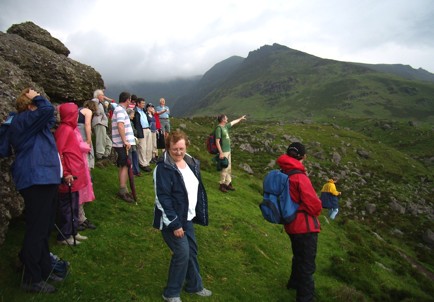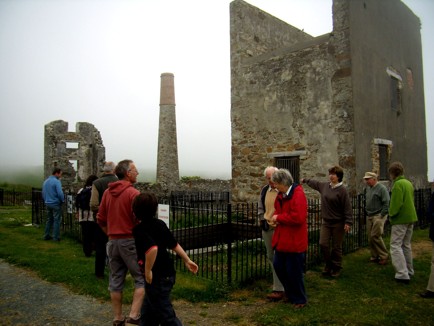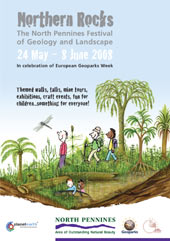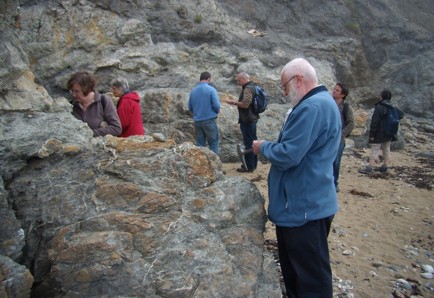
The European Geoparks Week, taking place at late May early June each year, is a European - wide festival of Geoparks aimed at raising public awareness of geoconservation and promotion of the geological heritage as well as events aimed at informing the wide public about geotouristic and educational activities in geoparks. The “European Geopark Week” activities of this year were held mostly in the period May 21-June 6. The EGN designed seven subjects for this year’s activities, i.e. Geo& Geo, Geo& Relish, Geo& Arts, Geo& Culture/Music/Literature, Geo& Action/Sport, Geo& Kids and Geo&EGN. This year’s activity subjects are relatively more and more concrete than last year’s that involve Exhibitions, Activities, Screenings, Presentations, Educational programs, and Celebrations.
Events are varied and include public talks, activity days for schools, guided walks, exhibitions, workshops ,etc.. In addition, each geopark scheduled every activity in detail and planned its specific program, involved people and manner while releasing the information of these activities to the public on their respective websites.

The English Riviera Geopark hit it big in its radio communications activity held during the EGN week. Greetings from Torbay (where the English Riviera Geopark is located) winged their way through the airwaves all round the world on May 28. The first English Riviera Global Geopark radio event has been hailed a huge success with some 300 to 400 people taking part. Amateur radio operators transmitted live from outside Kents Cavern in Torquay over the two days at the start of this week's English Riviera Geopark Festival. They made contact with around 500 radio hams, several from other geoparks, including Lesvos Island in Greece and the Copper Coast in Ireland. The English Riviera Geopark has the unique distinction of being the world's first urban Geopark. Situated within the stunning, rolling hills of South Devon, its geology has created the beautiful coastline of today, which fundamentally links the rich diversity of landscape with wildlife, people and culture.

Northern Rocks 2008 runs between Saturday 24 May and Sunday 8 June. The two weeks are filled with events and activities to help you discover the geological secrets of the North Pennines AONB and UNESCO European Geopark. The North Pennines AONB Geopark launched its North Rocks Festival 2008 between Saturday 24 May and Sunday 8 June. The two weeks are filled with events and activities to help visitor discover the geological secrets of the North Pennines AONB and UNESCO European Geopark. Northern Rocks 2008 is the fifth North Pennines Festival of Geology and Landscape. The festival celebrates the world-class geology of the North Pennines, mainly comprising such programs as themed walks, geological holidays, mine tours, talks, children's events and much more. The North Pennines Area of Outstanding Natural Beauty (AONB) covers almost 2000 square kilometres of upland in the north of England, including part of the counties of Cumbria, Durham and Northumberland. The area is of global importance for its geology and includes a classic example of a base metal orefield. Partly in recognition of this, though also in recognition of local efforts to conserve and interpret earth science, the North Pennines AONB was the first area in Great Britain to be awarded the status of European Geopark (June 2003).

The Copper Coast Geopark gave a Geology Course from May 26 to June 1. The course was aimed at a general audience with no specific background in geology, but a general interest in the topic. The course provided a general introduction to geology and the background to understand the geology of South East Ireland. 11 participants took part in the course, which consisted of 5 evening lectures and practicals from Monday to Friday in Knockmahon Primary School and week end fieldtrips to various locations along the Copper Coast to develop observation skills in the field and discover the local rocks. Besides, this geopark showed 15 tourists around the Mining Heritage of the Copper Coast,the iconic ruins of engine houses on top of the Copper Coast cliffs. There they heard about the mining history of the area during its heyday when it was once one of the largest copper mines of the British Empire until it came to an end. More than 35 people came to meet Willie Warren from the Geological Survey of Ireland and get an insight of the glacial geology of Coumshingaun. The management committee of this geopark takes eco-tourism, especially geo-tourism, instead of large-scale tourism activities as their principle of activity organization, since they think doing so will have few impact on the characteristic of their geopark.

The ongoing “European Geopark Week” activities are more diversified than before, making full use of various resources in a geopark (such as geoheritage, natural landscapes, cultural heritage and resources, animals and plants) and advocating geo-tourism as well as eco-tourism. Moreover, such activities have highlighted education more, notably these programs targeted at children.